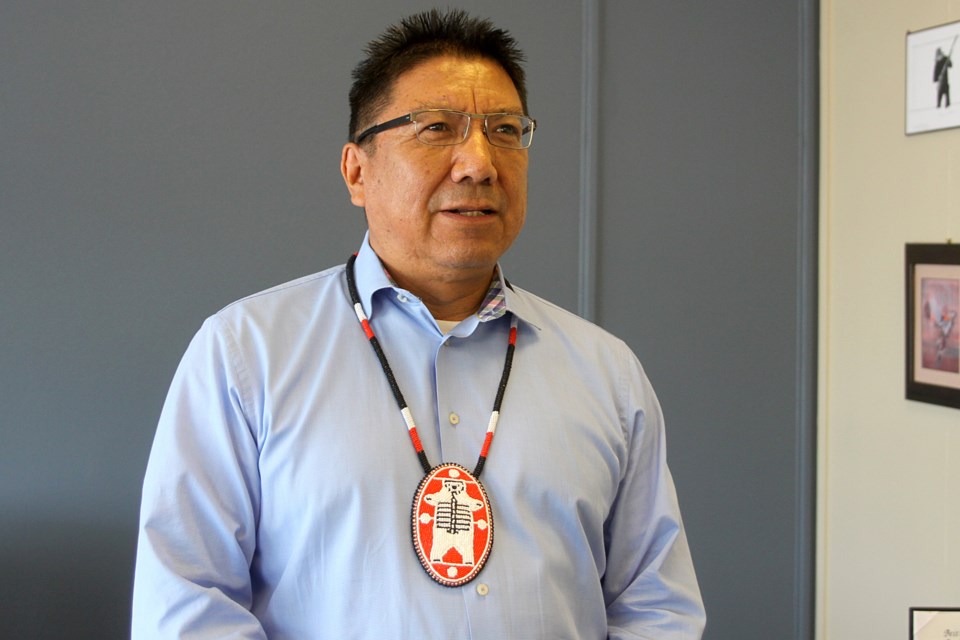THUNDER BAY – Nishnawbe Aski Nation is calling on Thunder Bay and Fort William First Nation to declare a state of emergency to address what Grand Chief Alvin Fiddler describes as a crisis for the safety of Indigenous youth in the city.
The decision to request the declaration was made at the conclusion of NAN’s two-day emergency chiefs meeting on education on Thursday, which brought leaders from across the organization’s territory together to Thunder Bay in an effort to improve safety for students coming to the city for the start of the next school year.
“It would send a signal to all our communities that both the city and Fort William First Nation accept what we’ve been saying that the city is in a state of crisis,” Fiddler said, adding a formal request would be made to Thunder Bay and Fort William First Nation officials on Friday afternoon.
“Based on what’s happened, especially these last few weeks, we need to treat this as a crisis and we all need to work together to address these issues.”
Fiddler said a declaration would increase the likelihood of having the provincial and federal governments provide additional resources.
Concerns have increased about the safety of Indigenous youth in Thunder Bay following the deaths of 17-year-old Tammy Keeash from North Caribou Lake First Nation and 14-year-old Josiah Begg in Kithcenuhmaykoosib Inninuwug First Nation earlier this year. The bodies of the two Indigenous teens were found in city waterways in May.
Those two cases came less than a year after a coroner’s inquest examining the circumstances surrounding the deaths of seven Indigenous students between 2000 and 2011 who lost their lives while attending high school in Thunder Bay from their remote First Nation communities.
Fort William First Nation Chief Peter Collins said he would need to consult with Fiddler and Thunder Bay mayor Keith Hobbs over what a state of emergency declaration would mean.
Whether he wouldn’t say whether he would follow the request, Collins said something needs to be done.
“That state of emergency is why are our kids being lost? Why are our kids dying when they come to Thunder Bay to go to school? Why are they getting lost in the rivers? Why are they being lost in the streets?” Collins said.
“Some of the things we need to do, we need to focus on what their problem is when they get here.”
In addition to the request to declare a state of emergency, the chiefs established an action plan that includes the formation of an emergency education task force to address six key issues including identifying immediate steps to address safety of wellness of youth attending school away from their home communities, identifying existing education options for students who want to remain in their communities, ensure resources are available for students wanting to attend other urban centres and create a safety plan with short-term measures for students in Thunder Bay this fall.
That task force will meet starting next week.
“Parents shouldn’t be forced to send their children to Thunder Bay,” Fiddler said.
“If there’s an opportunity for them to receive their schooling at home or closer to home in some of the smaller centres closer to our communities, then that should be their option and their choice. If we need to quickly build capacity in those centres, that’s what we should be working towards.”
There was also discussion around not allowing students to come to Thunder Bay in September, a notion that left Alaina Sakchekapo upset. The 16-year-old from North Caribou Lake First Nation intends to return to Dennis Franklin Cromarty High School for her Grade 12 year to graduate and said students should get to choose where they receive their education.
“I’ve grown so close with all the staff and students here. We’re basically family,” she said. “It makes me sad too because what if I don’t get the chance to finish with them and not graduate from here? Where else would I graduate from?”
While Sakchekapo said Thunder Bay has become a home, it wasn’t always easy. When she first arrived she admitted it was a struggle to find her way and adjust to her new surroundings.
That’s where older students can play a role in mentoring the new, younger students in learning how to navigate the city.
“Having to go through moving into a stranger’s house and learning the bus system, you’re kind of uprooted from everything you’ve ever known and you’re thrust into a new area with people you don’t know,” she said.
Fiddler and other members of the executive council had discussions with senior officials with both the federal and provincial governments on Friday morning. He said one idea of a safety measure that will be looked at in the coming weeks is an interim student housing solution, whether it be a group home or residential facility.
“Even though our students are able to access good boarding homes here in the city, it’s always a hit and miss,” Fiddler said. “We hear about good boarding homes but we also hear about bad boarding homes. Every child needs to live in a safe and welcoming environment.”
Collins, who met with North Caribou Lake First Nation Chief Dinah Kanate on Friday, sees the potential for NAN to work with Fort William First Nation to provide students with the opportunity to participate in activities such as hunting and trapping.
“If we prepare them, Fort William could help with that and guide them in the right direction,” Collins said. “I said at the inquest that maybe that youth home should be in Fort William. Build it here. We have sweat lodges and things that they can utilize to keep their culture and traditions alive and well when they do come to Thunder Bay.”
